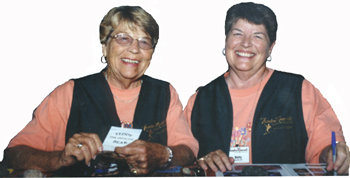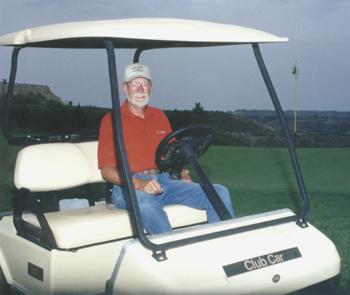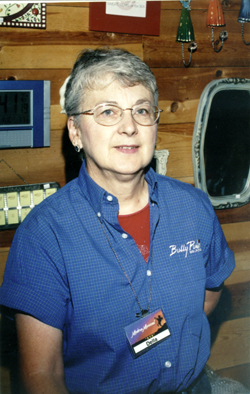The new version of Workamper.com is...
Read moreHistoric Medora Has the Answer to Summer Jobs
Historic Medora Has the Answer to Summer Jobs
 Medora, North Dakota, a tiny storybook western town settled on the edge of Theodore Roosevelt National Park owes its present existence to three men. The Marquis de Mores founded the town in 1883 on the banks of the Little Missouri River and named it for his beautiful wife, Medora. The young Frenchman’s thirst for adventure, along with his ambition to be the richest financier in the world, led him to invest in a meat packing plant, a radical idea for the 1800s. The development of a refrigerated railroad car spurred his vision that the cattle industry and the nation’s consumers would be better served by slaughtering the animals near their range and shipping the beef quarters to markets back east. A scheme ahead of its time, the Marquis’ business failed within three years. A tall brick chimney where the plant once stood and a 26-room summer home open for tours remain as evidence of his dream.
Medora, North Dakota, a tiny storybook western town settled on the edge of Theodore Roosevelt National Park owes its present existence to three men. The Marquis de Mores founded the town in 1883 on the banks of the Little Missouri River and named it for his beautiful wife, Medora. The young Frenchman’s thirst for adventure, along with his ambition to be the richest financier in the world, led him to invest in a meat packing plant, a radical idea for the 1800s. The development of a refrigerated railroad car spurred his vision that the cattle industry and the nation’s consumers would be better served by slaughtering the animals near their range and shipping the beef quarters to markets back east. A scheme ahead of its time, the Marquis’ business failed within three years. A tall brick chimney where the plant once stood and a 26-room summer home open for tours remain as evidence of his dream.
In the same year, Theodore Roosevelt first visited the Badlands of North Dakota, principally to hunt big game. Roosevelt, known best for soldiering, hunting, and conservation, soon partnered with two other men in cattle operations. The following year, grief-stricken and devastated from the deaths of his young bride and his mother on the same day, he returned to North Dakota and established the Elkhorn Ranch. Roosevelt claimed that life in the Badlands gave him the strength to later become the President of the United States. His footprints and influence remain in Medora, specifically in the 110 square miles of North Dakota Badlands that became a National Park named in his honor.
However, Medora’s present-day restoration is due to the generosity and dedication of Harold Shafer, founder of the Gold Seal Company in Bismarck. Schafer grew up dirt poor on a North Dakota farm and worked his talent for salesmanship and marketing into millionaire status. In the 1940s, his company marketed Glass Wax, Snowy Bleach, and Mr. Bubble, products familiar to households during the 1950s. By 1965, Schafer became deeply involved in Medora’s restoration, lavishly spending his time, energy, and money on the town’s revitalization. His fingerprints are visible today in boardwalks, wooden storefronts on both original or reproduction buildings, and profusely blooming flowers in nooks and corners.
Schafer’s idea for the Medora Musical became North Dakota’s number one attraction. The Musical is professionally produced and performed in the Burning Hills Amphitheater in North Dakota Badlands and visited by more than 110,000 people each summer. In 1986, the Harold Schafer family and the Gold Seal Company donated their holdings in Medora to form the Theodore Roosevelt Medora Foundation, a public, non-profit organization. The Foundation’s mission is to preserve the values and traditions of the Old West entrenched in the pioneer cattle town of Historic Medora and to pay tribute to the “Bully Spirit” of Theodore Roosevelt. The Foundation hires over 300 people each year to work in the picturesque town.
 Attractions include: The Chateau De Mores State Historic Site, Museum of the Badlands, North Dakota Cowboy Hall of Fame, Bully, the Play, Theodore Roosevelt’s Maltese Cross Ranch Cabin, Medora Doll House, Badlands Saloon, downtown shops, restaurants, motels, cabins, stables, historic hotels, and a campground,. Seasonal jobs for Workampers are available in many of these establishments.
Attractions include: The Chateau De Mores State Historic Site, Museum of the Badlands, North Dakota Cowboy Hall of Fame, Bully, the Play, Theodore Roosevelt’s Maltese Cross Ranch Cabin, Medora Doll House, Badlands Saloon, downtown shops, restaurants, motels, cabins, stables, historic hotels, and a campground,. Seasonal jobs for Workampers are available in many of these establishments.
Positions include: wranglers, motel clerks, communication center reservation clerks, campground employees, retail sales, maintenance and grounds personnel, theater technicians, housekeeping and laundry staff, ice cream parlor attendants, cooks, salad preps, dishwashers, waiters and waitresses, hosts and hostesses, and bartenders. Personnel director, Wendy Miller notes that one position is available for a shuttle driver to pick up young workers in Dickinson daily and drive them to Medora and return them home. She also points out that more jobs for Workampers are opening at the new Bully Pulpit Golf Course.
High school and college students fill many roles at Medora. However, 20 more mature volunteers converge on the town each week in a special program offered by the Medora Foundation. These enthusiastic individuals cover a number of positions. Some arrive early in the season and help with planting flowers and sprucing up the town. A few might stay up to three weeks.
Bill and Delores Thompson from Minnesota arrived one week in early August. Their first time to be accepted into the volunteer program, Delores described an intense orientation on their first day. Typical of all summer volunteers, the Thompsons’ schedules varied and often split their six to seven hour workday with several hours off during the daytime. Duties included hosting at the information center and the Harold Shafer Heritage Center, working at the Pitchfork Fondue in the evenings, selling tickets for Bully, the Play, and ushering at the Medora Musical. In return for the volunteers’ work, each receives lodging and free or discounted meals.
 The eager individuals accepted as volunteers report that they enjoy their jobs and the chance to spend a week in a charming, historic town. One person states that her week in Medora is the highlight of the summer. Four sisters, traveling from Minnesota, North Dakota, and Colorado to spend time together, affirm that volunteering at Medora is their favorite vacation.
The eager individuals accepted as volunteers report that they enjoy their jobs and the chance to spend a week in a charming, historic town. One person states that her week in Medora is the highlight of the summer. Four sisters, traveling from Minnesota, North Dakota, and Colorado to spend time together, affirm that volunteering at Medora is their favorite vacation.
Applications are accepted through the Theodore Roosevelt Medora Foundation. Wendy Miller says that each year the applications exceed the available positions. She notes that Medora has many repeat Workampers and volunteers. “I make a point to attend each orientation session for volunteers,” she says. “It sounds like a school reunion!”
For all positions—volunteer or paid--the Foundation seeks people with enthusiasm and a willingness to work. Whenever possible, experience, skills, and preferences are matched to available jobs.
The majority of employees, especially young workers at Medora, are housed in dormitory rooms. However, Miller describes approximately 10 spaces reserved for Workampers in the Medora Campground. A few adults live in housing furnished by the Foundation. Weekly volunteers are housed in motels. Those with RVs stay in the campground. Meals are provided for employees and volunteers with four choices of eateries.
Most positions with the Medora Foundation require employees to wear uniforms furnished upon arrival. Volunteers wear a dark green vest over regular street clothes. On-duty employees wear blue shirts monogrammed with the Theodore Roosevelt Medora Foundation logo.
Schedules include 37.5 hours per week in five or six days per week, including Saturdays, Sundays, and holidays. Individuals who desire more hours are encouraged to work extra time at the Medora Musical.
Clarence and Della Wolff, full-timers formerly from North Dakota, have been at Medora for two seasons. Clarence, retired from Montana/Dakota Utility Company, fits well into the maintenance department.
“Working for a gas company in installation and repairs prepared me for the jobs I do on properties owned and operated by the Foundation,” he explains. “Some days, I might be called to unplug a toilet at a motel, fix an air-conditioner, or change out a light bulb. Many of the same things a homeowner would fix, except motels are very large houses!”
Clarence also cleans the swimming pools and takes time to pull jokes on some of the guests. “I feel no pressure in this job,” he adds. His wife, Della, works in retail at Medora, primarily at the Rough Riders Gift Shop. She, too, says that the job utilizes skills she had honed before her retirement.
One retiree, Ray Sandness, currently works as the golf course marshal at Bully Pulpit Golf Course. His wife works at the call center, taking reservations for the Medora Musical, Pitchfork Fondue, the motels, and Bully, the Play. During the season, they live in housing furnished by the Foundation.
Employees and volunteers of Medora Foundation are admitted free of charge to Medora Musical every night except Saturdays from mid July through Labor Day. Other free activities include trail rides at the Medora Riding Stables, mini golf, swimming at the Medora City swimming pool, the 4M-Review Show, and Bully, the Play. Employees receive a 25 percent discount at all Theodore Roosevelt Medora Foundation gift shops and at Foundation-owned restaurants not included in the employee meal plan.
Medora Foundation’s season runs from May through September. Their human resources department requests that applicants be precise about employment availability dates. Applicants who would like to be specifically considered for late season replacement positions are also encouraged to apply.
For a few days, inspired through Medora’s interpretive programs, museums, and attractions, the traveling public steps into an era of the Old West that influenced the 26th President of the United States. However, Workampers on the job for a week or an entire summer season relive their patriotic heritage on a daily basis.
For more information, check www.medora.com

